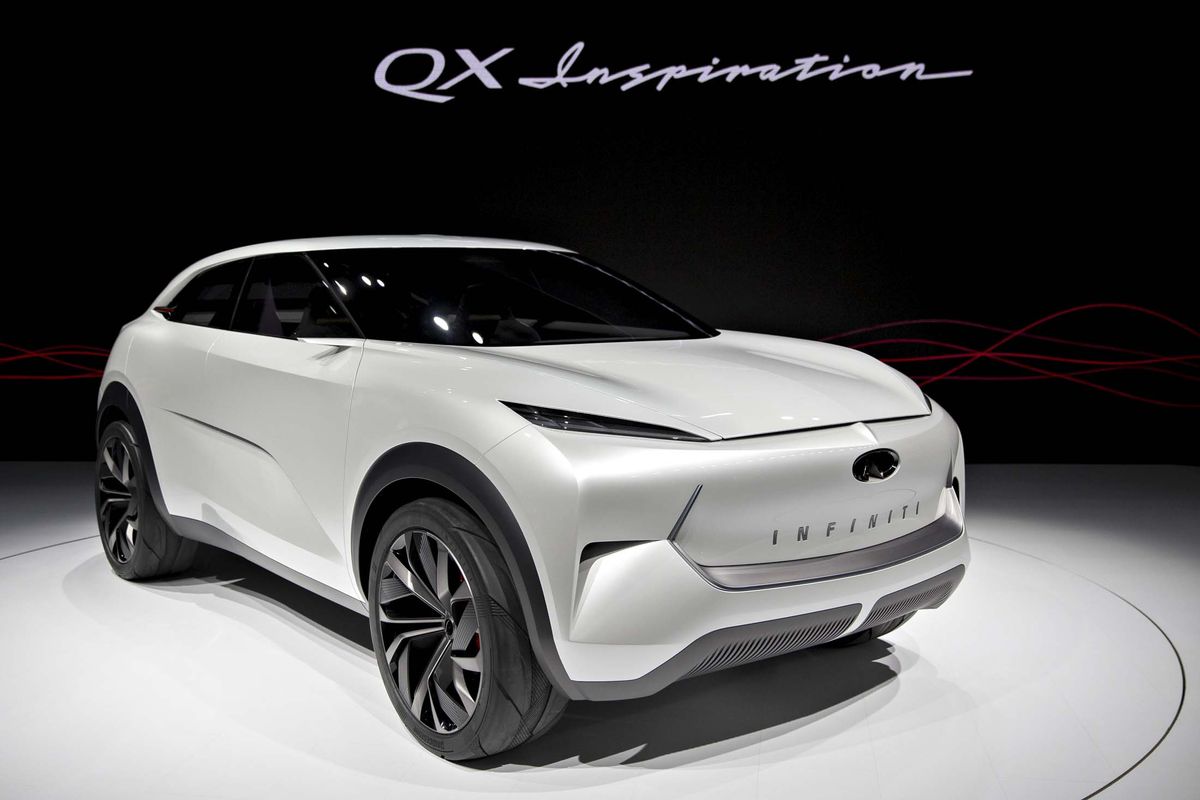Auto
Infiniti Plans to Offer Only Electric or Hybrid Vehicles by 2025

Lately, it seems, Infiniti can’t catch a break.
Sales slumped last year to 149,280 vehicles in the U.S., down 2.7 percent from 2017. The automaker’s QX30—a small crossover that should be capitalizing on the unfettered thirst Americans have for compact SUVs—hit just 8,101 units in the U.S., down nearly 43 percent from 2017. The larger QX50 was one the worst cars I drove last year. Carlos Ghosn, the chief executive officer of parent company Nissan Motor Co., has sat in jail in Tokyo since November on charges of financial crimes.
At the Detroit auto show on Monday, Infiniti’s futuristic electric crossover concept, the QX, refused to pull forward onto the stage on cue as its designer continued through his scripted presentation.
So, what gives?
Christian Meunier, the new president of Infiniti, puts it bluntly during an interview earlier this week with Bloomberg News.
“Infiniti, for a lot of reasons, has been very much middle-of-the-road for many, many years and has tried to do too many things and tried to compete head-to-head with everyone—all the premium brands, including the Germans,” says the Paris-born executive.
His comments ring true. Models such as the Q60 and Q70 sedans have struggled to gain footholds against the better-engineered, more striking offerings from BMW, Mercedes, and Porsche, which are selling twice as many vehicles in a single month—and at higher prices.
Infiniti falls into the dangerous luxury-lite category that is first to take a hit when consumer confidence falters, according to Charles Chesbrough, senior economist at Cox Automotive, a research and analysis firm that owns Kelley Blue Book and AutoTrader. There’s a surplus of used luxury vehicles at the moment. When given the choice between a lightly used luxury car or a vehicle from a premium brand such as Infiniti, consumers will prefer the used version.
“Gently used vehicles are taking away some consumers who could potentially buy new vehicles,” Chesbrough tells Bloomberg in Detroit. “Consumers are looking for cost savings, and they want to get the products that they really want.”
According to Meunier, Infiniti shouldn’t be competing against luxury brands, anyway. “We don’t want to be the No. 1 brand, we want to be the No. 1 challenging brand,” he says. “We can’t be the car for everyone. We don’t need 50 different models like the Germans. We need the ones that will give us the edge in the market place.”
The right cars, Meunier believes, will be electric. Infiniti has already produced a few concepts, including the Prototype 10 and the QX that stalled in Detroit. But the company is years behind luxury brands such as Tesla (Model S and Model X), Audi (E-Tron), Jaguar (I-Pace) and Porsche (Taycan), all of which have already launched electric vehicles or will do so this year.
“The purpose for the next two to three years is not to grow,” Meunier says. “It’s to consolidate and to prepare for the launch of all these cars. It’s to get ready for electrification.” By 2025, the company plans to sell only vehicles with electric or hybrid-electric powertrains. If all goes as planned, the first batch will roll off the line by 2021.
That will be a significant increase since early 2018. At the time, company executives said that only half of their global sales would come from electrified vehicles by 2025.
Infiniti hopes to sell its new EVs to a new generation of buyers. In the next 10 years, 40 percent of all new vehicles will be sold to millennials, according to AutoTrader data. The generation is less loyal to heritage brands than were their predecessors.
“They want experience, and they want technology,” Meunier says. “They want to feel different. They want a product that makes them better as a person. Infiniti has a big role to play there.”
-

 Banking & Finance2 months ago
Banking & Finance2 months agoOman Oil Marketing Company Concludes Its Annual Health, Safety, Environment, and Quality Week, Reaffirming People and Safety as a Top Priority
-

 News2 months ago
News2 months agoJamal Ahmed Al Harthy Honoured as ‘Pioneer in Youth Empowerment through Education and Sport’ at CSR Summit & Awards 2025
-

 OER Magazines2 months ago
OER Magazines2 months agoOER, December 2025
-

 News2 months ago
News2 months agoAI Security Conference 2025 Hosted by Securado Highlights the Changing Cybersecurity Landscape
-

 Insurance1 month ago
Insurance1 month agoSupporting Community Wellness: Liva Insurance Sponsors Muscat Marathon 2026 with Free Health Checkups
-

 Interviews1 month ago
Interviews1 month agoEXCLUSIVE INTERVIEW: TLS Rebranding Marks Strategic Leap Toward Innovation, Sustainability & Growth
-

 Insurance3 weeks ago
Insurance3 weeks agoLiva Insurance Supports Community Wellness Through “Experience Oman – Muscat Marathon 2026”
-

 Banking & Finance3 weeks ago
Banking & Finance3 weeks agoA New Platform for SME Growth: Oman Arab Bank Unveils Tumouhi































You must be logged in to post a comment Login